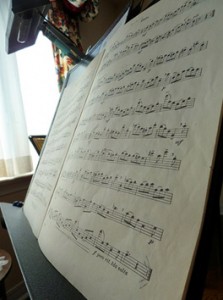The Benefits Of Being Classically Trained As A Musician
WWhether you are a self-taught musician or are only beginning to play an instrument, consider learning music by being classically trained. With classical training, you will be taught by professionals the various components that go into the composition of music. Learning how to play an instrument or learning how to sing by a professional can help you to better understand your instrument and technique in order to become a well-ranged musician.

Image Credit: @Doug88888 at Flickr.com
While is it true that a self-taught musician has his/her own style, technique and improvisation skills, and that professional classes can be costly, there are benefits to being learning music the traditional way.
For a self-taught seasoned musician who already has a natural creative spark, it would be interesting for them to go back to the basics and find out what areas he/she needs to work on by training with a professional – undoubtedly, depth and musical range will be broadened.
When you train classically, you learn music theory. Learning music theory, which is the study of how music works in terms of rhythm, melodies and form, can help you hear and create music in a way you never have before. By learning from a professional, you will learn methods of playing your instrument as well as learn new things that you may not have known practicing on your own.
It is like the saying, “Know the rules, so you know how to break them properly.” Classical training offers you the rules to making music so you will have a background and reasoning to your musical choices. Tack of foundation that comes with not being classically trained tends to lead to variances and improvising; classical training, on the other hand, offers you consistency.
After completing a traditional music course, you have more options. You can stick to your previous playing technique or discover a new technique that will work better for you.
In terms of the self-taught vocal artist, a professional will be able to tell you if you are using your vocal chords to their full potential and if you are doing so properly. You do not want to injure your vocal instrument, especially if you plan on being in the music industry for the long run. You do not want to injure your body either as a musician – after being formally trained, you may learn that you were previously playing in a manner that would have worn out your hands or injured yourself.

Image Credit: Gord Bell at Flickr.com
You will learn how to read music and sight read on the spot when you choose to learn from a music professional. Self-taught musicians tend to play by ear, which is great, but perhaps sight reading will prove to be beneficial as well. You may even find that you learn and play music quicker by sight reading. You will be able to expand your musical possibilities when you read music.
Being classically trained can also help you in other aspects of life – learning music has been shown to improve math and language skills since learning about patterns in music helps you recognize patterns in math and language.
Just think, if you ever wanted to be a concert pianist or lead singer for an acappella group, your dream could become much more of a reality if you were to classically trained. Although being a self-taught musician is an achievement in itself, private music lessons could open many more doors for opportunities.
Participating in a professional music class will enable you to read, learn and interpret music from different angles. You can enhance your technique and understand the “how’s” and “why’s” in the way music is formed. Overall, classical training provides you the opportunity to develop your craft to produce rich music.
Marcela De Vivo is a freelance writer from Southern California. She loves writing about music, whether she’s focusing on the industry or music therapy and education.


Comments